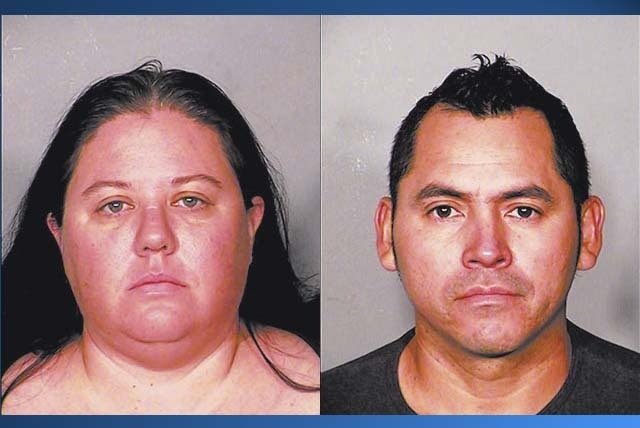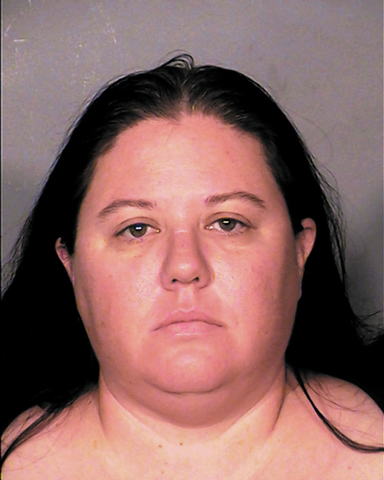Mother of son injured in foster care: ‘I don’t think the system works at all’
Jessica Hargrove needed persistence to get the Clark County Department of Family Services to act on concerns about her 17-month-old son in foster care.
It took repeated visits to the Family Services permanency worker handling her case and two calls to the county child abuse hotline. Nineteen days after her first hotline call, Family Services staff located the toddler and his baby brother in Sandy Valley. Hargrove’s sons were taken from the foster parents, who were criminally charged in the neglect case. That’s according to her interview with the Review-Journal and other public records.
County officials defend how Family Services handled the case, saying the information reported to the hotline didn’t rise to the level of alleged abuse or neglect.
Hargrove disagrees, emphasizing how long it took the Department of Family Services to act on her hotline calls and locate her children.
“You’re supposed to go to the hotline when everything else fails, and they failed,” she said last week. “I don’t think the system works at all.”
Hargrove’s case also has raised concerns about inconsistencies in the county’s 2009 policy for foster caregiver support services. It references procedures for investigating potential foster licensing complaints that don’t yet exist.
County spokesman Erik Pappa said those licensing policies were never finalized because state regulations have been pending for an extended period. When licensing regulations are finalized, which is anticipated in 2014, corresponding policies will be developed and put in place, he said.
He also stressed that the existing policy adheres to state law and the Nevada Administrative Code.
WHAT THE MOTHER DID
Hargrove first took concerns about her son’s severe rash to the permanency worker on her case. Permanency workers are assigned to cases involving foster children, biological parents and foster care providers. The county employee told her it was a diaper rash.
The worker told her to call the hotline if she had concerns, Hargrove said.
So she made her first call on Sept. 4.
Less than two weeks later, Hargrove saw no improvement in her son’s condition.
Again, she voiced concerns to her permanency worker. Again, she was told to call the hotline with concerns.
Hargrove placed her second call on Sept. 17.
On Sept. 19, a county foster licensing investigator unsuccessfully tried to contact the foster parents at their Las Vegas residence.
On Sept. 23, 19 days after Hargrove’s first call, the Department of Family Services finally tracked down the foster parents and Hargrove’s two children at an unapproved location — a trailer in Sandy Valley.
The 17-month-old boy had a three-inch burn scar on his arm and another large scar on his buttocks. According to police records, the foster parents opted not to take the toddler to the doctor after he was burned. The injury happened when the foster parents’ 13-year-son changed the toddler outside on a hot day, using a plastic bag as a diaper and a black mini-fridge as a changing table, records show.
Hargrove’s 2-month-old baby had infections in every skin fold.
The foster parents, Waldo Hernandez, 40, and his wife, Andrea Hernandez, 38, have each pleaded guilty to one felony count of child neglect or endangerment with substantial bodily harm in the case.
Both have declined comment. They are scheduled to be sentenced on Feb. 13.
A doctor who examined the toddler found the boy had suffered second-degree burns, possibly even third-degree, according to public records.
Getting someone to act on her worries was a frustrating experience, Hargrove said. “It’s just a circle. You’re just on a run around. Nothing’s getting done.”
The system needs to be fixed, but she isn’t sure what the answer is.
Jessica’s mother, Lovenia Hankerson, of Long Beach, Calif., agrees. She also called Family Services with concerns about the slow response to her daughter’s concerns.
“They’re not doing their job the way it should be done,” Hankerson said. “The child’s supposed to be the number one priority, but it doesn’t seem like that.”
Family Services removed Hargrove’s children from her care after a domestic conflict between her and her boyfriend. She’s now taking parenting classes and hopes to regain custody.
“Somebody has to do something,” Hargrove said. “Because imagine how many other situations could have happened like this.”
HOTLINE PRIORITIES
If the county had considered Hargrove’s hotline calls as reports of possible neglect or abuse, the response would have been swifter.
For calls that are considered potential abuse or neglect, the hotline has three priority levels, based on the severity of the reported information. Those levels require responses within three hours, 24 hours or 72 hours.
But since the Sept. 4 hotline call was considered to be a foster licensing issue, it was still unresolved on Sept. 19, two days after Hargrove made a second hotline call.
On that day, foster licensing investigator Anita Moody tried to contact the Hernandez family at a Las Vegas residence, the only known address the department had on file, police records show.
With no one home, she left a business card in the door.
On Sept. 22, Andrea Hernandez emailed the department to tell them that the family would be in Sandy Valley for the next four days without phone service, police records show.
On Sept. 23, two Department of Family Services employees headed to Sandy Valley, located about 50 miles southwest of Las Vegas. They located the children and removed them from the foster parents.
The email the department received from Hernandez didn’t give an address in Sandy Valley, and the employees didn’t have it, police records show.
Their first stop was the public school in Sandy Valley to see if the foster parents — who have older biological children — had given the Clark County School District an address, according to a transcript of a statement Moody gave police on Oct. 22.
“We had no idea,” Moody told police. “So we started with the school and went into the school and showed our identification… At the school we obtained the address information of where they were located.”
Moody told police she believed school records showed the children had been enrolled in Sandy Valley for about three weeks or a month.
The Review-Journal asked the county why the Department of Family Services didn’t check School District records sooner.
In an email, Pappa said the Review-Journal’s information was “inaccurate and incomplete,” but declined to elaborate, citing the state confidentiality law for child abuse and neglect cases.
According to a police report based on statements from the foster providers and their son, the 17-month-old boy was injured in early June.
Yet, on the county’s part, no red flags arose from required visits by county foster staff between June and September, when the mother called the hotline.
County policy requires foster workers to conduct in-person visits with foster children at least once every 30 days. A county spokeswoman has said that policy was followed.
A QUESTION OF POLICY
Clark County’s policy for foster caregiver support services was finalized in 2009. It cites procedures for investigating potential licensing violations of foster providers that are unclear.
The policy, which is on the county’s website, states: “When the Department receives a complaint about a caregiver that alleges a licensing violation, the licensing compliance investigator will conduct an investigation according to the procedures in Section 81000: Licensing Complaint Reviews and will notify the case manager and supervisor.”
However, those procedures don’t exist.
“We are not able to provide you with a copy of ‘Section 81000: Licensing Complaint Reviews’ as it was never finalized or adopted,” said Pappa in an email responding to an information request from the Review-Journal. “DFS follows the Licensing regulations as promulgated in the Nevada Administrative Code.”
When the county policy was written, officials expected state licensing regulations to be finalized promptly, according to Pappa.
Bill Grimm, senior attorney with the California-based National Center for Youth Law, is providing legal representation in a federal class-action lawsuit against the county that seeks to improve the safety of children in foster care.
“That just seems, to me, to be bizarre,” said Grimm of the references in county policy to procedures that don’t exist. “If that’s been going on for four years, you’ve got to ask: ‘How is that possible?’ ”
State regulations don’t give a specific deadline for responding to potential foster home violations that don’t rise to the level of neglect or abuse. Mary Woods, spokeswoman for the Nevada Department of Health and Human Services, said a report that involves a possible licensing violation and not abuse or neglect typically gets a response within a day in counties served by the state.
“In the rurals, our practice is to make contact either by phone or in person on the day the report comes in, and if we make contact by phone, the practice is to respond in person the next business day,” she said. “This, however, is our practice, not a law or statewide policy.”
All policies and procedures for the Department of Family Services are being revised under a three-year, $3 million contract with Action for Child Protection, a North Carolina-based nonprofit. The county approved the contract in April, before the Hargrove case happened. That’s one of the several ongoing changes in the department under the consultation contract that’s supposed to help the agency improve its work.
“It provides long-term systematic change,” said Family Services Director Lisa Ruiz-Lee days before the Clark County Commission approved the contract in April.
Contact reporter Ben Botkin at bbotkin@reviewjournal.com or 702-405-9781. Follow him on Twitter @BenBotkin1. Contact reporter Yesenia Amaro at yamaro@reviewjournal.com or 702-383-0440.



















